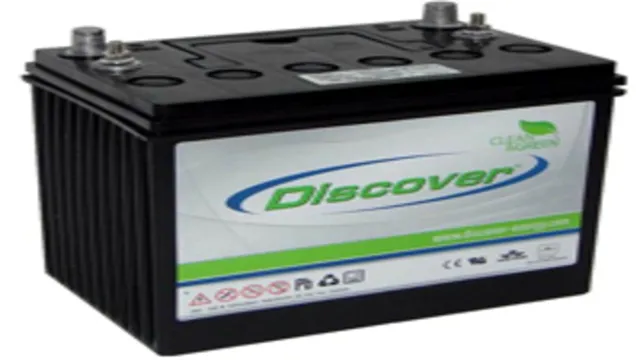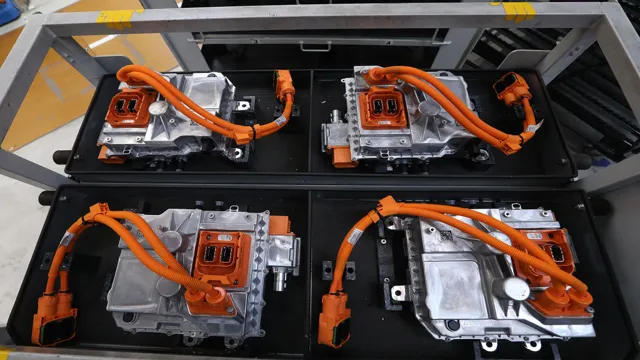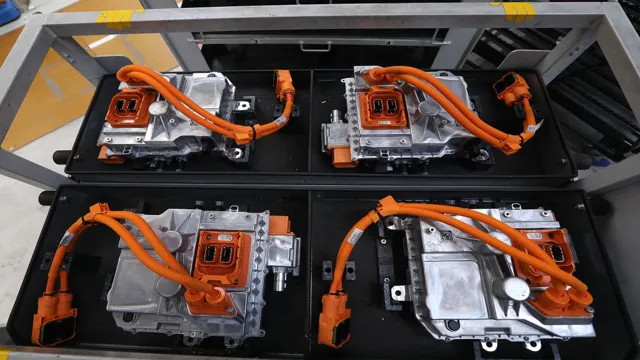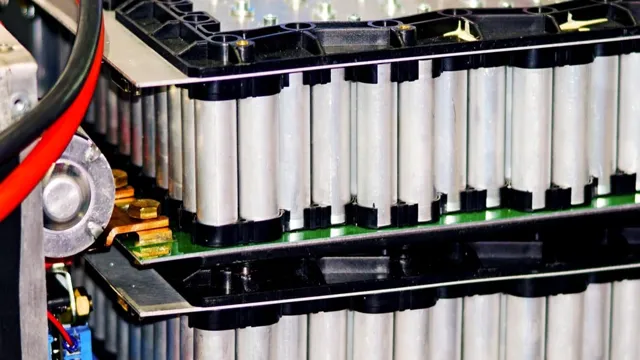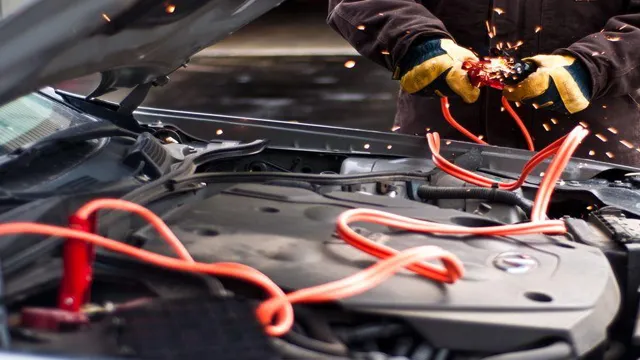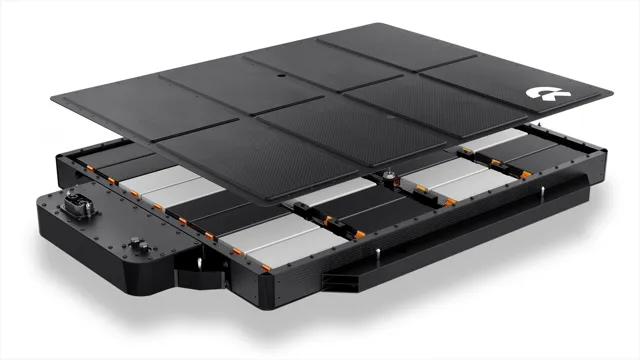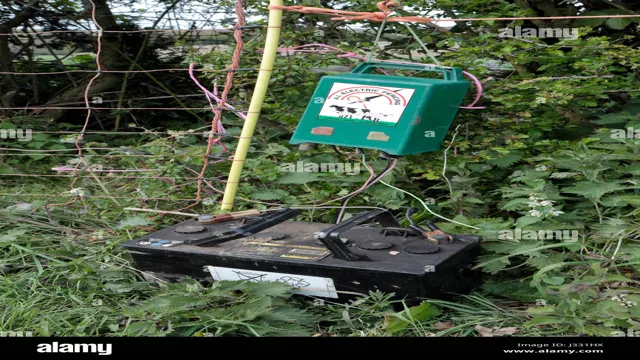Breaking Down the Battery Barrier: The Future of Electric Car Recycling
Electric cars are becoming more popular every day as people realize the benefits of owning one. They’re environmentally friendly, energy-efficient, and cost-effective. But as with any technology, there are drawbacks.
One of the most significant issues facing electric car owners is what to do with the batteries once they’re no longer functional. Recycling electric car batteries is the solution to this problem, and it’s a growing industry. These batteries are expensive to manufacture and contain precious metals, so finding a way to reuse them is not only the responsible thing to do but it’s also smart.
Recycling electric car batteries involves disassembling the battery pack and recovering the valuable materials inside, such as copper and cobalt. These raw materials can then be used to make new batteries, creating a closed-loop system that reduces waste and saves energy. By recycling used batteries, we can reduce our carbon footprint and preserve valuable resources.
But this process isn’t as simple as it may seem. Recycling these batteries safely requires specialized equipment and expertise. It also involves dealing with potentially hazardous materials, such as lithium, which can be dangerous if not handled properly.
Therefore, it is essential to have a proper recycling infrastructure in place to ensure the safe disposal of electric car batteries. In conclusion, recycling electric car batteries is an important step towards creating a sustainable future. It not only reduces waste but also helps conserve scarce resources.
As electric cars continue to grow in popularity, we need to develop and improve the recycling infrastructure to ensure that we can deal with the end-of-life batteries safely and responsibly.
Benefits of Recycling Electric Car Batteries
Yes, the batteries in electric cars can be recycled and there are actually a number of benefits to doing so. One of the primary advantages is that recycling these batteries can help to reduce the amount of waste that ends up in landfills. Additionally, recycling these batteries can also help to conserve natural resources that are used in the production of new batteries, such as lithium, cobalt, and nickel.
Furthermore, recycling these batteries can also help to decrease the carbon footprint associated with their production and disposal, as it requires less energy to recycle materials compared to mining and refining new raw materials. Finally, recycling electric car batteries can also create new job opportunities and contribute to the development of a more sustainable economy. All in all, recycling electric car batteries is a wise and responsible option that can benefit the environment, society, and economy alike.
Reduces Environmental Pollution
Recycling electric car batteries can significantly reduce environmental pollution. Electronic waste accumulation is a major problem worldwide, with the majority of the waste ending up in landfills. However, electric car batteries can be reused or recycled, reducing the need for the extraction and production of raw materials, thereby reducing the impact on the environment.
The process of recycling batteries is straightforward as the cells contain valuable materials such as lithium, cobalt, and nickel. By recycling these materials, we can minimize the environmental pollution caused by extraction and reduce the amount of waste we generate. Recycling electric car batteries is beneficial in protecting our environment and ensuring sustainable development.
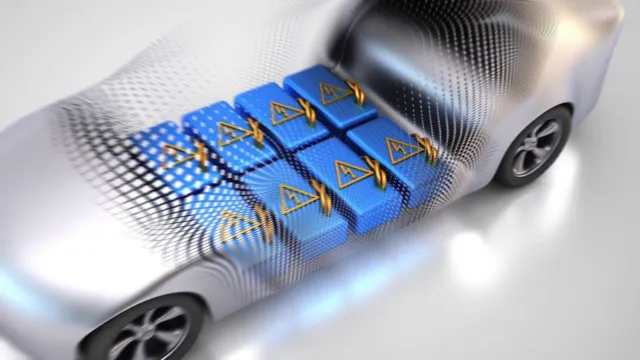
Conserves Natural Resources
Reusing electric car batteries through recycling has numerous benefits, one of them being the conservation of natural resources. Recycling these batteries helps reduce the demand for raw materials, such as lithium and cobalt, which are extracted from mines and can have harmful environmental impacts. By recycling these batteries, we can reduce the amount of these natural resources that are extracted from the earth, and instead use the materials already in circulation.
This not only conserves natural resources, but it also reduces greenhouse gas emissions and helps mitigate climate change. In addition, recycling electric car batteries can also prevent toxic substances from being released into the environment and protect the health of both humans and wildlife. When electric car batteries are recycled, the materials that make up the battery can be used to create new batteries, reducing waste and promoting sustainability.
Overall, recycling electric car batteries offers an eco-friendly solution that benefits both the environment and society as a whole.
Disadvantages of Not Recycling Electric Car Batteries
Can the batteries in electric cars be recycled? Yes, they can. However, not recycling these batteries can have a number of negative impacts. One major disadvantage is the potential harm to the environment.
Electric car batteries contain highly toxic chemicals that, if not disposed of properly, can contaminate the soil and water. Furthermore, not recycling these batteries can lead to a shortage of valuable resources, such as lithium and cobalt, which are critical components used in the production of new batteries. Additionally, not recycling these batteries can lead to increased energy consumption and greenhouse gas emissions, as more energy is required to mine and produce new battery materials.
In conclusion, it is crucial that we prioritize recycling of electric car batteries in order to mitigate the environmental, economic, and social impacts of end-of-life batteries.
Toxic Waste and Hazardous Materials
As the world shifts towards the use of electric cars, the problem of disposing of used and damaged electric car batteries arises. These batteries contain toxic and hazardous materials, and not recycling them properly can have severe environmental consequences. The lithium-ion batteries used in electric cars can cause soil and water pollution, as well as harm plant and animal life.
The production and disposal of these batteries also result in the emission of greenhouse gases, contributing to climate change. Apart from the environmental impact, a lack of recycling these batteries also translates into a waste of valuable resources. Elements such as cobalt, nickel, and lithium, which are extracted from these batteries, have economic value and are vital to the production of new batteries.
Therefore, not recycling electric car batteries can lead to scarcity of these crucial resources in the future. It is crucial to prioritize the proper disposal and recycling of electric car batteries to minimize the negative impact on the environment and to ensure that these vital resources are reused.
Increased Carbon Footprint
One significant drawback of not recycling electric car batteries is the increased carbon footprint. When EV batteries are not recycled, they end up in landfills, where their toxic chemicals can be harmful to the environment. The lithium, cobalt, and nickel used to make these batteries require intensive mining and refining processes that release large amounts of greenhouse gases, contributing to global warming.
By recycling these batteries, we can control the release of these harmful materials while reducing the need for new mining operations. It’s essential to recycle these batteries to reduce the environmental impact of EVs, which are supposed to help us combat climate change rather than worsen it. So, let’s ensure we appropriately recycle electric car batteries to limit the carbon footprint and preserve our environment.
Increases Global Warming
Electric car batteries can be recycled to help reduce global warming, but when they are not, they can contribute to the problem. The manufacturing process for these batteries requires a significant amount of energy, which can lead to higher levels of CO2 emissions. When these batteries are not recycled, they will eventually end up in landfills where they can leak harmful chemicals into the soil and water, further harming the environment.
In addition, the mining of metals used in these batteries can also have negative impacts on the environment. By not recycling electric car batteries, we are not only wasting valuable resources but also contributing to the very issue we are trying to solve by using electric cars. It is important to recognize the disadvantages of not recycling these batteries and take the necessary steps to ensure they are properly disposed of and reused.
Recycling Process of Electric Car Batteries
Yes, the batteries in electric cars can be recycled, and the process involves several steps. First, the battery is collected from the car and transported to a recycling facility. Next, the battery is shredded, and the different components of the battery are separated.
The lithium-ion cells are then broken down, and the different materials are further processed. The materials such as cobalt, nickel, and lithium are extracted and can be used for new batteries or other products. The recycling process not only reduces waste but also conserves natural resources by reusing valuable materials.
Proper recycling of batteries also prevents harmful chemicals such as lead and mercury from entering the environment and affecting human health. Therefore, recycling electric car batteries is not only economically beneficial but also environmentally responsible.
Battery Shredding and Sorting
The recycling process of electric car batteries is vital for reducing the environmental impact of these types of vehicles. Battery shredding and sorting are two key steps in this process. Shredding the batteries into small pieces allows for the separation of the different metals and materials inside.
These materials can then be sorted and reused in the manufacturing of new batteries or other products. The metals recovered from the batteries, including copper and aluminum, can be used in a variety of industries, reducing the need for mining new materials. Additionally, the plastics and other materials can be recycled and used in the production of new items.
Overall, the recycling process of electric car batteries is crucial in protecting the planet’s resources and reducing waste.
Extraction of Valuable Metals
In the search to find more sustainable ways of powering our vehicles, electric cars have become increasingly popular. However, the batteries used in these cars pose a problem when they need to be replaced. Fortunately, the materials found in these batteries can be recycled.
Companies have developed processes to extract valuable metals like lithium, cobalt, and nickel from these batteries, which can then be used to create new batteries. Not only does this help with the sustainability of electric cars, but it also reduces the need for mining these metals. So, when it’s time to replace your electric car battery, don’t forget about the benefits of recycling.
Your old battery could be a valuable source of material for a new one.
Conclusion: Recycling Electric Car Batteries
In conclusion, the answer to whether or not the batteries in electric cars can be recycled is a resounding yes! Thanks to advancements in technology and increasing environmentally-conscious attitudes, recycling and repurposing components of electric vehicles is becoming easier and more common. With the potential to reuse the valuable materials within these batteries and reduce waste, the future looks bright for both electric cars and the planet. So, next time you charge up your electric vehicle, rest assured that the battery can live on beyond its initial lifespan.
“
FAQs
Are electric car batteries recyclable?
Yes, electric car batteries can be recycled. Recycling can help reduce the environmental impact of electric car batteries and ensure their components are reused responsibly.
How does battery recycling work in electric cars?
Battery recycling in electric cars involves retrieving and breaking down the battery cells, extracting valuable metals and materials, and processing them for reuse. This can involve several steps, including crushing, heating, and chemical treatment.
What happens to the recycled materials from electric car batteries?
The recycled materials from electric car batteries can be used in a variety of new products. For example, the metals recovered from lithium-ion batteries can be used to create new batteries, while plastic components can be used to create new car parts.
Is recycling electric car batteries cost-effective?
Recycling electric car batteries can be cost-effective, as it is often more affordable than extracting and refining new metals and materials. Additionally, recycling can help reduce the environmental impact of battery production and disposal.
